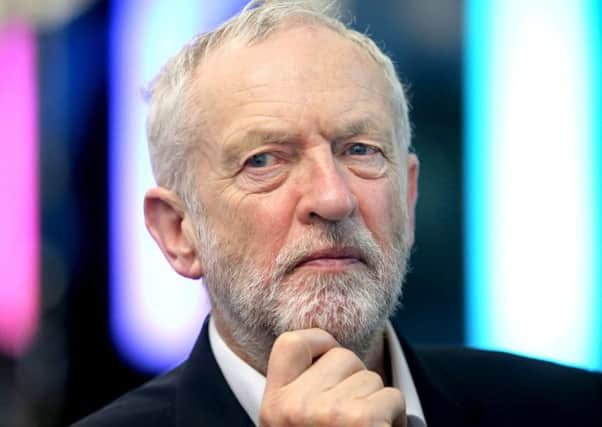Euan McColm: Corbyn part of the disease, not the cure


When Jeremy Corbyn wrote, in a piece published online on Friday evening, that people who dished out anti-Semitic poison needed to understand that they did not do it in his name, the faithful raced across social media spreading the good news; this was leadership and anyone who doubted Corbyn’s commitment to making the Labour Party a safe place for Jews was guilty of acting in bad faith.
From the outside looking in, it was a most unseemly sight.
While Corbyn hummed and hawed for months about this problem – a problem he now concedes exists – his loyal supporters bought into the narrative that accusations of anti-Semitism in the Labour Party had been cooked up, or at least cynically exaggerated, in order to attack a good and decent man. Now that their hero had admitted the party had a problem, their position changed. Yes, Labour had been polluted by anti-Semitism – and thank goodness there was a man of the calibre of Corbyn ready to act to solve the problem.
Advertisement
Hide AdAdvertisement
Hide AdThe intellectual inadequacy and moral cowardice required to see the world in the way Corbynistas now do is quite the heady cocktail.
Corbyn’s friends may insist he is not an anti-Semite but it is certainly the case that he has spent a lot of time in their company.
Whether hosting an event on Holocaust Memorial Day during which Israeli Jews were compared to Nazis or sitting silently during a meeting of Labour’s National Executive Committee while an ally insisted allegations the party had an anti-Semitism problem had been cooked up by Donald Trump-supporting Jews, Corbyn has, depending on your grip on reality, either spent much of his career enabling anti-Semites or been terribly, terribly unlucky.
Nobody is that unlucky.
And so Corbyn’s insistence that he is the man to root out anti-Semitism in the Labour Party rings especially hollow.
His supporters – who wouldn’t dream of offering the same benefit of the doubt to a political opponent similarly accused – may now be proclaiming their support for Corbyn’s mission but they are kidding themselves that he is the man to do something about the fact an ever-increasing number of Jews are now speaking out about Labour’s anti-Semitic cancer.
Corbyn spent his years of political obscurity associating with the sort of cranks who gladly spread conspiracy theories of an anti-Semitic flavour. Old tropes about bankers, and globalists, and the “Israeli lobby” are the very definition of anti-Semitism. Corbyn, having lived comfortably among the sort of people who gladly spread this sort of hatred, cannot now deal with the problem. He is the problem.
The Labour leader wrote on Friday evening that he was confident an “outstanding issue” created by his party’s refusal to adopt the International Holocaust Remembrance Alliance’s definition of anti-Semitism could be resolved through dialogue with community organisations over the next month.
This was blasé to the point of offensiveness. The Labour Party has doubled down, time and again, over recent months on its rejection of claims of anti-Semitism in the party. And Corbyn – leader in name, at least – is entirely responsible for that. It is his failure to act, his failure to even see a problem, that has brought Labour to this sorry place.
Advertisement
Hide AdAdvertisement
Hide AdIn the three years since he became leader of the opposition, Corbyn has had ample opportunity to come down hard on the anti-Semites – including elected members and office bearers – in his party and the pattern of events is now well rehearsed. He acts only when he has no option but to do so.
An especially repugnant argument now propagated by some of Corbyn’s loyal foot-soldiers is that, yes, Labour has a problem with anti-Semitism but that this problem has also been used to undermine the leader. This is precisely the sort of conspiracy theory that we might expect from anti-Semites. If Corbyn has been undermined by anti-Semitism in the Labour Party it is because anti-Semitism exists within the Labour Party.
The Labour Party is currently threatening disciplinary action against veteran MP Dame Margaret Hodge after she challenged Corbyn in the House of Commons about his failure to deal with the problem. This is, of course, madness. If, as Corbyn now grudgingly admits, anti-Semitism has polluted the Labour Party then he, as leader, is responsible. The buck stops with him. That is what leadership means.
Rather than trying to bully Hodge, who has made clear her understandable contempt for the disciplinary process into which she has been dragged, Corbyn should be begging for her forgiveness.
If Labour is to regain the trust of Jews and anyone who genuinely believes anti-Semitism to be evil, then the necessary first step must be the departure from the leader’s office of Jeremy Corbyn. He has spent years swimming in the shit with Jew haters and conspiracists and no amount of scrubbing will remove the stench that wafts around him.
Those who continue to defend Corbyn have no option but to buy into the notion that he is a victim of malign forces. And those forces must include the various Jewish organisations and newspapers that have criticised him. To defend Corbyn, now, one must believe that Jews are out to get him. One must adhere to the sort of anti-Semitic garbage that has brought Labour to this sorry place.
Corbyn will not resolve any “outstanding issues” with the Jewish community in the month ahead. Instead, his presence at the top of the Labour Party will remain a provocation to anyone who believes in true equality for all. This is not just a matter that should concern decent members of the Labour Party. It remains possible that Corbyn could, if the Brexit crisis engulfing Theresa May’s government leads to another election, become prime minister.
He is, quite simply, unfit to hold that position. His latest intervention on Labour’s anti-Semitism crisis surely underlines that simple truth.